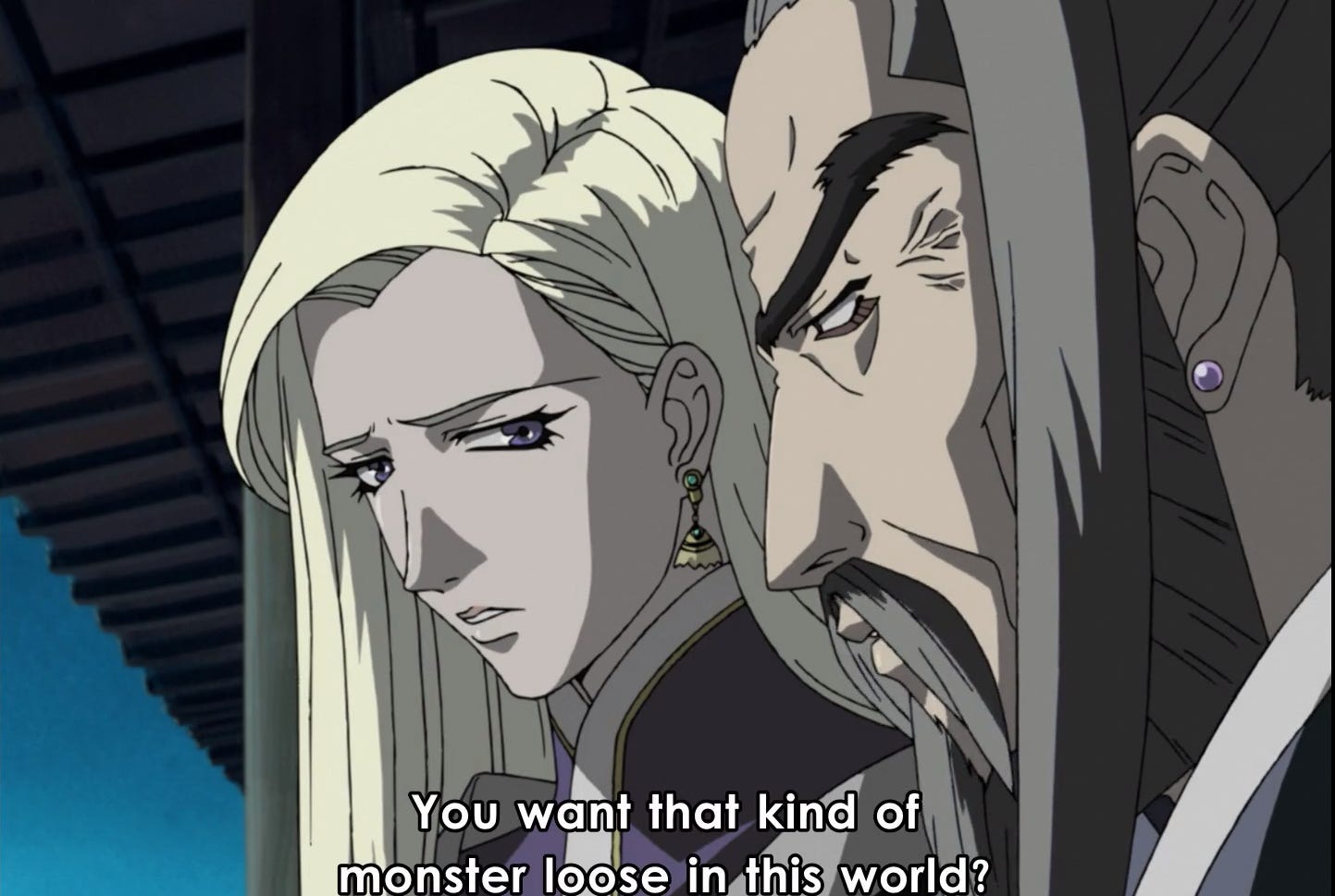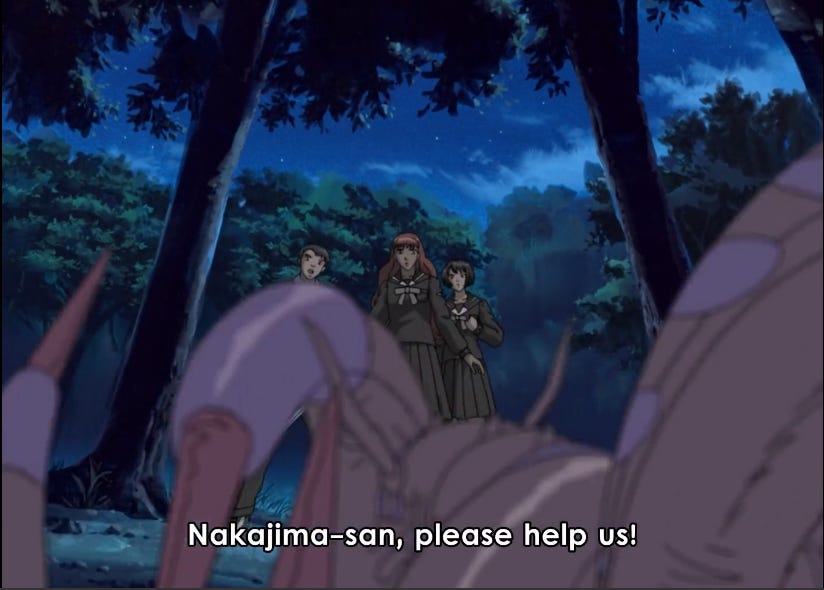[Anime's Carnot] The Twelve Kingdoms (十二国記 - Juuni Kokuki), Episode 3 review



Yuka, Yuka, Yuka. What are you doing?
If nothing else, this episode gave us maybe one of the most unintentionally funny exchanges I’ve seen in anime:
“Your Majesty, three people have died already? Why are you going this far?”
“In their land, women gave birth. How disgusting? You really want them to spread that nonsense here?”
Like his face hardly changes at all when saying that.
There’s surely a trope or an archetype for the sweet, cuddly grandma who lives alone and practically exists to aid our heroes on their travels. I knew from the instant she appeared she’d be good vibes. Heroes, plus Sugimoto, I mean.
There’s also an archetype for the character always on the wrong side of things. Sugimoto is the foil, a mirror to a feeble Nakajima.
Yuka and Youko. Or Youko and Yuka, since Nakajima in these scenes has to always come first. It’s Nakajima’s world and Sugimoto’s just living in it. Originally trying to run off on her own the instant she was cut loose, the wound that Nakajima later healed at Grandma-san’s house was the only thing which perhaps stopped her from an embarrassing fate like their captor’s.
Against the wolf pack she’s a damsel in distress, begging Nakajima to kill them. At the grandma’s house, yelling for Nakajima to kill her too. This is the Nakajima show. Before any scene, Sugimoto will be standing behind her, and anywhere you’re at, fast-forward, and you’ll find Sugimoto still standing there after. And yet, even when she’s ahead of her, doing the dirty work, stealing to survive, wanting to kill before she can be killed, our MC having the capacity to still cry, her pain being recognised by Grandma-san, makes it feel like she’s the one lagging behind.
The episode makes use of its typical cutaways and dreams to showcase where we’re heading next. We start with someone who may or may not be Mr Beauty from Episode 1.


His role isn’t clear, but we do know that Keiki’s homeland, Kei (of course), has all but fallen to the Youma, and the one who has ascended to the throne is the former King’s younger sister. The “Hōmei” (鳳鳴) didn’t take place, which seemed to imply that her ascendance was illegitimate. If anyone remembers the older Pokemon generations, Hō (鳳), the symbol for a mystical bird, is part of the spelling for Hō-Hō (鳳鳳) — that dumb-looking, legendary pigeon. The woman who Sugimoto seems to have mistaken for Keiki saving her life was ordered by our anti-womb King to head there as well. In another cutaway from the previous episode, Asano likely saw that same person perform some ritual with the dying Keiki. Noting these details like the ring on her hand, forming the subplots that underpin the story, and the Claw dream from Episode 1 becomes less of a rudimentary scene you can just skip over. For the Sugimoto fan club, these scenes should represent the stages and reasons for her eventual betrayal.
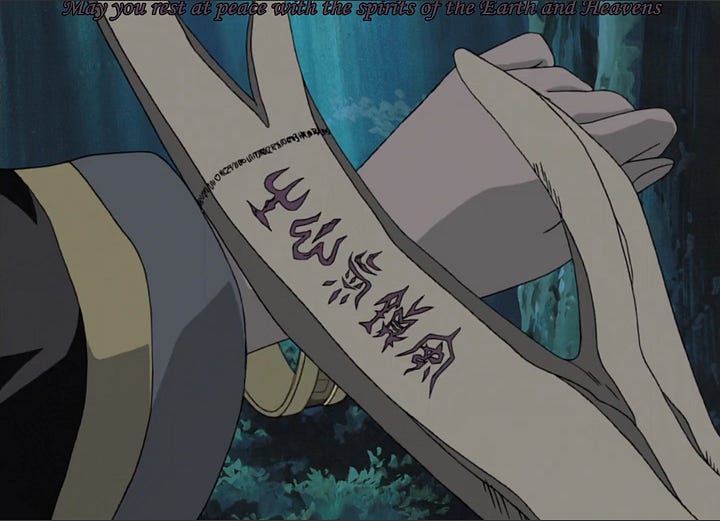


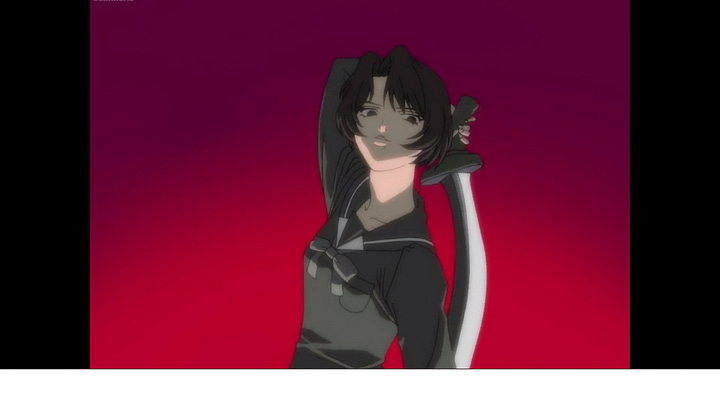
Why is it worth remembering these details? Sugimoto believes she’s special because she believes she was saved by Keiki-not-Keiki. She’s managed to turn that into something which validates her. Despite the sword, despite his actual words, being saved by Keiki makes her special. What will it mean when she learns Keiki is dead*, and the Taiho who saved her did it more out of sympathy for Kaikyaku than anything else? Paying attention to Sugimoto’s word choices as the wolves circled them, she was self-centred to the point it was concerning. As the Youma attacked their carriage, she was yelling like a madwoman: I’m here! You found me, Keiki! You came to save me, Keiki!

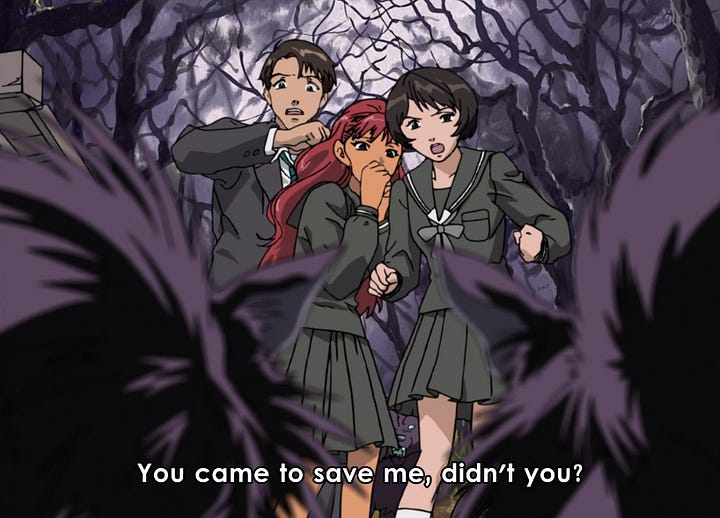
She’s always in a position to be beneath Nakajima; the settings where her pragmatic personality is depicted are always negative.
Conditions like where she’s always the bad one continue appearing, considering the direction that the other two are moving in, and a nurturing ground elsewhere for her underappreciated perspective and know-how starts to appear on the horizon.
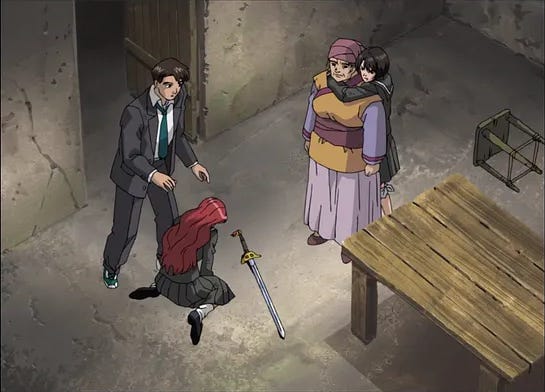
Final thoughts:
Did you like my use of images more? Too much? I’m interested in how they affect the flow of what I’m saying. I’m also interested in the new possibilities. I’m interested in bouncing words off images and seeing if I can change their meaning.
I’m liking the anime so far. It’s interesting because I’d probably like it more if my review process didn’t take so long. It’s trying to phrase things right more than anything else. But the details I’m noticing are coming as a result of reviewing. I am making good strides in doing it faster, though.
This post is the third in a series of reviews of The Twelve Kingdoms. If you’d like to be kept updated on any new reviews, please consider spicing up your inbox by clicking below.
It makes for a good change to “Is this you? IP: 192.168.0.1 has accessed your location from Tromsø, Norway.” Brighten things up with some anime instead.
If you’re interested in seeing any other anime get a review, or perhaps something resonated and you’d like to talk about it, please consider leaving a comment. Feedback is always welcome.






